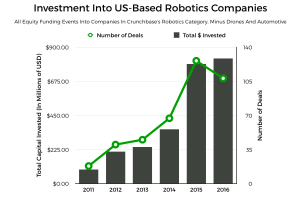At this very moment, there’s someone working away in a factory somewhere in Shenzhen or at a manufacturing plant in Israel, or maybe even a facility in Gaithersburg, Md., prepping the assembly of one of the 10,000 robots that a small Israeli company wants to bring into the world this November.
The Tel Aviv-based company, Roboteam, has already made millions selling a host of robots to militaries around the world — and now they’re tackling the consumer market.
But unlike its pack-mule, scout or bomb-removal bots, these new robots are going to be designed to help grandma bring out the tea and cookies (or crumpets for those across the pond).
The company has actually raised $50 million from Fenghe Investment Group and from the group’s famous co-founder, John Wu, the former venture capitalist turned Alibaba chief technology officer. Matt Hu, the group’s co-founder and chief investment officer, also invested personally in the company.
It’s a big bet on a company that’s hoping to pivot from (admittedly really hardcore) military robots into a commercially viable product that the company’s co-founder, Yossi Wolf, says will be the first to crack the home market successfully.
“Roboteam defense is probably the number one provider of tactical robots in the world,” says Wolf of the company’s current business. “We’re the only startup in Israel to penetrate the Pentagon [and] have generated over $100 million in revenue [with] thousands of systems right now and completing big programs of $1 billion around the world.”
Here’s the type of stuff that the company is making now.
When Wolf talks about what’s next for the company he and his co-founder, Ilad Levy, launched seven years ago, he emphasizes that it will be nothing like the company’s current crop of battle droids.
Instead, Wolf pictures a robot like Rosie from the Jetsons (but not h-o-m-e-l-y). “Seven years ago I went to visit my dear grandma. When I saw her trying to carry a cup of tea and cookies and she was shaking… I knew we can provide the services to help elderly people.”
The seasoned veteran of Israel’s Air Force special forces scoffs at some of the other robot assistants that are currently in production. They are, he says, toys that haven’t actually found a valid use case in the home.
Roboteam was tight-lipped about the design and branding for the new robot that’ll be rolling out from its consumer-facing subsidiary, but I did manage to pry a few details from Wolf.
The robot will be about three feet high, with an interactive 10-inch display. At about 22 pounds, the thing is no lightweight, but can be carried manageably. It’ll be equipped with 40 sensors that will enable autonomous movement and it’ll be equipped with a tray to carry things.
I said it sounded like a very fancy side table with an interactive display and some smart-home connectivity features. “But sexy!” Wolf said.
As these robots roll off the shelves, Roboteam envisions a methodical go-to-market strategy to put them in consumers’ homes in time for Christmas.
There’ll be pop-up shops in tech-savvy cities like New York, Los Angeles and Boston… along with a coordinated campaign to pitch the first 10,000 units. One thing that the company won’t do, Wolf said, is try a promotional Kickstarter or Indiegogo campaign.
“We very much reject the Kickstarter model of pre-sale and then failing to deliver,” says Wolf. We’re investing in the launch and plan to launch with 10,000 units ready for delivery. I will not launch without readiness.”

For Wolf, the new product embodies the best of a number of different technologies. “It’s all the Alexa things and Google Home together with all the video experience of FaceTime and WhatsApp — and with great mobility,” he said in his pitch. “It can move. It can talk. It can listen. It can understand you.”
Since the launch of iRobot’s Roomba in 2002, the idea of an in-home robot has made the trip from science fiction to daily reality in many people’s imagination. The thought of a Rosie robot in the home isn’t some figment of the imagination, but a possibility for hundreds. The problem is no one seems to know what to do with them.
I’ve seen Pepper in the wild and “she” creeps me out. Things like Jibo are personified but seem fairly pointless as a hub (Amazon Echo and Google Home seem both more practical and less ickily focused on developing a relationship with kids in the home), Beam is being used as a tool for meetings, but strikes me as pretty ridiculous (in interviews I have to resist the urge to push it around and make it face the wall) and, finally, the Asus Zenbo is Wall-E-esque, but doesn’t have any utility (it’s a better designed, mobile Jibo).
What can’t be disputed is the amount of money venture capitalists are willing to throw at the robot market. Things are heating up with skyrocketing interest in industrial and personal robotics companies over the last three years, according to data from Crunchbase. Venture firms put in record amounts of money in 2015 and 2016 — with totals approaching $900 million each year, up from under $450 million in 2014, Crunchbase data shows.

